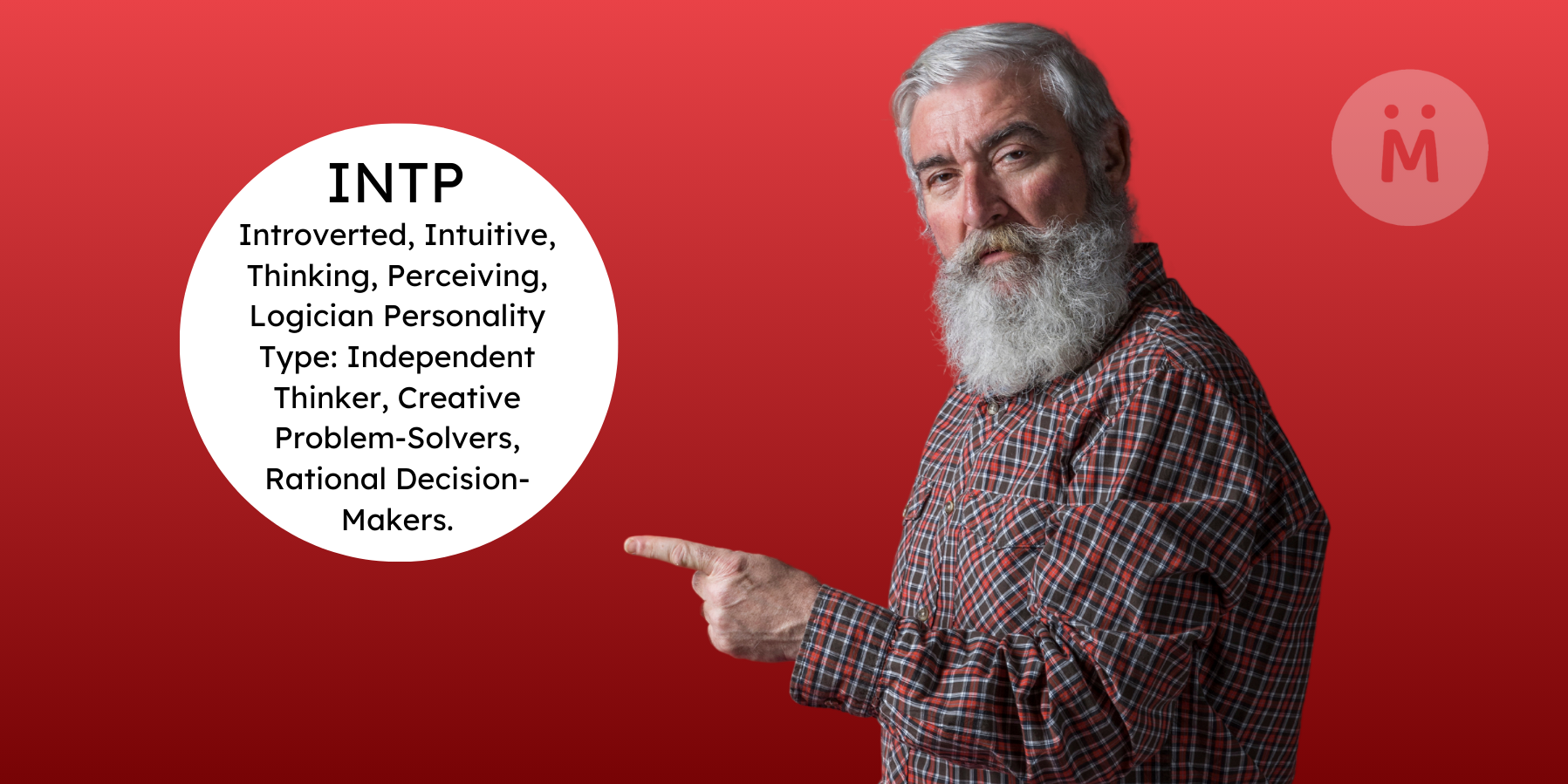Diving Into the Personality of the Logician - INTP
Margo Plater

In this article, we delve into the intricate world of personality types, focusing specifically on the Logician archetype as identified by the renowned 16 Personalities test. As human beings, understanding ourselves and others is a fundamental aspect of personal and professional growth. The 16 Personalities test serves as a valuable tool, offering insights into our individual preferences, behaviors, and thought patterns.
Exploring the 16 Personalities Test
The 16 Personalities test categorizes individuals into one of sixteen distinct personality types. These types are determined by preferences in four key areas: extraversion vs. introversion, sensing vs. intuition, thinking vs. feeling, and judging vs. perceiving. Each combination of preferences results in a unique personality profile, offering a comprehensive understanding of an individual's psychological makeup.
Unveiling the INTP Personality Type
Among the sixteen personality types, the Logician, also known as INTP (Introverted, Intuitive, Thinking, Perceiving), is characterized by a profound curiosity, analytical prowess, and a penchant for independent thinking. You, as an INTP personality type are renowned for your innovative ideas, logical reasoning, and insatiable thirst for knowledge.
Analyzing INTP Traits
- Independent Thinker: INTPs are known for your ability to think outside the box and challenge conventional wisdom. You approach problems with a unique perspective, often unraveling complex issues with your analytical minds.
- Creative Problem-Solvers: With a natural inclination towards innovation, INTPs excel in finding novel solutions to intricate problems. You enjoy exploring abstract concepts and brainstorming unconventional ideas.
- Rational Decision-Makers: Driven by logic and reason, INTPs prioritize objective analysis over emotional considerations when making decisions. You thrive in environments where critical thinking and intellectual debate are encouraged.
Understanding the Logician Archetype
The Logician archetype embodies a rare blend of intellect, curiosity, and creativity. You possess a deep-seated desire to unravel the mysteries of the universe and understand the underlying principles governing the world around you.
Description of the INTP Acronym:
Introverted (I)
You tend to be introspective and reserved, preferring solitary activities or small group interactions over large social gatherings.
Intuitive (N)
You possess a strong intuition and are drawn to abstract ideas and concepts. INTPs are adept at seeing the big picture and exploring possibilities beyond the realm of the tangible.
Thinking (T)
Logic and reason are paramount for INTPs. You approach situations analytically, relying on objective criteria rather than subjective emotions to make decisions.
Perceiving (P)
INTPs have a flexible and open-ended approach to life. You thrive in environments that allow for exploration and experimentation, often adapting your plans and strategies as new information arises.
Overview of the Logician Personality Type
The Logician personality type, represented by the acronym INTP (Introverted, Intuitive, Thinking, Perceiving), encompasses a unique set of traits and characteristics that distinguish you from other personality types.
Common Misconceptions about Logicians:
Cold and Aloof: One common misconception about Logicians is that you are unfeeling or detached. In reality, you may simply prefer to process your emotions internally rather than express you outwardly.
Inflexible and Stubborn: While Logicians may hold strong convictions based on logic and reason, you are not necessarily closed-minded. You are open to new ideas and perspectives, provided you are supported by evidence and sound reasoning.
Socially Awkward: Due to your introverted nature, INTPs may sometimes be perceived as socially awkward or aloof. However, this is not indicative of a lack of social skills but rather a preference for deeper, meaningful interactions over superficial small talk.
Lack of Direction: Some may mistakenly believe that Logicians lack direction or purpose in life. In reality, you are driven by a desire to explore and understand the world around you, often pursuing multiple interests and passions simultaneously.
By dispelling these misconceptions and gaining a deeper understanding of the Logician personality type, we can foster greater appreciation for the unique strengths and qualities that you bring to the table.
Understanding the Strengths and Weaknesses of Logicians
In the realm of personality types, Logicians, also known as INTPs, possess a unique set of strengths and weaknesses that define your character and influence your interactions with the world around you. Understanding these traits can offer valuable insights into your behavior, motivations, and potential areas for personal growth.
Strengths of Logicians
Analytical Thinking
Logicians are renowned for your analytical prowess. You possess an innate ability to dissect complex problems, identify patterns, and devise innovative solutions. Your sharp intellect and logical reasoning make you invaluable assets in fields such as science, technology, engineering, and mathematics (STEM).
Creativity and Originality
Despite your logical inclination, Logicians also exhibit a remarkable degree of creativity. You possess a vivid imagination and a penchant for thinking outside the box. This creative spark enables you to envision unconventional approaches and pioneer groundbreaking ideas that challenge the status quo.
Independence and Autonomy
Logicians cherish your independence and autonomy. You thrive in environments where you have the freedom to explore your interests, pursue your passions, and chart your own course. Your self-reliant nature empowers you to navigate life's challenges with confidence and resilience.
Rational Decision-Making
Rationality is a cornerstone of the Logician's mindset. You approach decision-making with a cool-headed pragmatism, weighing the pros and cons before arriving at a well-reasoned conclusion. This rational approach helps you navigate complex choices and avoid being swayed by emotion or impulse.
Weaknesses of Logicians
Tendency Towards Perfectionism
While your pursuit of excellence is admirable, Logicians may fall prey to perfectionism. You hold yourself to impossibly high standards and may become frustrated or disheartened when you fail to meet your own lofty expectations. This perfectionistic streak can impede your progress and hinder your ability to take risks or embrace imperfection.
Difficulty in Expressing Emotions
Despite your keen intellect, Logicians often struggle to express your emotions effectively. You may find it challenging to articulate your feelings or connect with others on an emotional level. This emotional aloofness can lead to misunderstandings or strain in your interpersonal relationships, as others may perceive you as distant or detached.
Procrastination and Indecisiveness
Due to your analytical nature, Logicians may experience paralysis by analysis when faced with a multitude of options. You may procrastinate or struggle to make decisions, fearing that you will make the wrong choice. This indecisiveness can hinder your progress and prevent you from taking decisive action when it is needed most.
Sensitivity to Criticism
Beneath your stoic exterior, Logicians may harbor a deep-seated sensitivity to criticism. While you may appear outwardly confident, you may internalize negative feedback and ruminate over perceived failures or shortcomings. This sensitivity can undermine your self-esteem and erode your sense of self-worth if left unchecked.
How Logicians Attack Problems
Logicians, often referred to as the "architects" or "thinkers" of the personality spectrum, possess a unique approach to processing information. Your analytical skills are unparalleled, characterized by a relentless pursuit of logic and reason in every aspect of your lives.
Logical Precision and Rationality
At the core of a Logician's cognitive framework lies an unwavering commitment to logical precision. You meticulously dissect information, scrutinizing each detail for coherence and consistency. This meticulousness ensures that your conclusions are grounded in sound reasoning, free from the biases that often cloud judgment.
Unconventional Problem-Solving Techniques
Logicians exhibit a propensity for unconventional problem-solving techniques, eschewing traditional methods in favor of innovative approaches. You thrive on complexity, viewing challenges as opportunities to exercise your intellectual prowess. Rather than adhering to preconceived notions, you embrace ambiguity, leveraging your analytical acumen to devise elegant solutions to even the most perplexing dilemmas.
Data-Driven Decision Making
In the realm of decision-making, Logicians rely heavily on data-driven insights. You meticulously gather and analyze relevant information, seeking patterns and correlations that elude the untrained eye. This empirical approach enables you to make informed decisions with a high degree of confidence, minimizing the risk of errors or oversights.
Adaptive Flexibility
Despite your penchant for structure and order, Logicians possess a remarkable degree of adaptive flexibility. You recognize that the best-laid plans often require adjustments in response to changing circumstances. Rather than viewing deviations from the plan as setbacks, you embrace you as opportunities for growth and refinement, demonstrating a resilience that is as impressive as it is pragmatic.
Long-Term Vision
At the heart of the Logician's strategic planning process lies a long-term vision that transcends immediate concerns. You possess an innate ability to conceptualize future scenarios, envisioning potential outcomes with remarkable clarity. This visionary perspective enables you to formulate strategies that are not only effective in the short term but also sustainable in the long run, ensuring continued success and growth.
Inspiring Intellectual Curiosity
Logician leaders inspire intellectual curiosity among your peers, fostering an environment of continuous learning and growth. You encourage exploration and experimentation, challenging conventional wisdom and pushing the boundaries of what is possible. By nurturing a culture of intellectual curiosity, you empower your teams to think critically and creatively, driving innovation and driving progress.
Unlocking the Potential of Logicians in Relationships and Career Paths
Romantic Relationships
Logicians, known for your analytical minds and rational approach to life, bring a unique perspective to romantic relationships. When it comes to dating and commitment, Logicians value intellectual stimulation and compatibility above all else. You seek partners who can engage you in deep conversations and share your love for exploring new ideas and concepts.
In romantic relationships, Logicians may appear reserved at first, taking your time to analyze your feelings and your compatibility with your potential partners. You are not ones to rush into commitments lightly but instead prefer to build a strong foundation based on mutual respect and understanding.
Despite your introspective nature, Logicians are capable of forming deep and meaningful connections with your partners. You are loyal and committed once you find someone who aligns with your values and stimulates your intellect. However, you also require space and independence to pursue your interests and maintain your sense of individuality within the relationship.
Friendships
In friendships, Logicians value quality over quantity. You seek out individuals who share your interests and passions, with whom you can engage in intellectually stimulating conversations and exchange ideas freely. While Logicians may not be the most social or outgoing individuals, you cherish the connections you form with like-minded friends.
Logicians are often drawn to friendships with people who can challenge your thinking and offer fresh perspectives. You appreciate friends who respect your need for solitude and intellectual pursuits but are also there to support you emotionally when needed.
Despite your tendency to be introspective, Logicians can be fiercely loyal friends who are always willing to lend a listening ear and provide thoughtful advice. You may not express your emotions overtly, but your friends know you can rely on you in times of need.
Professional Relationships
In professional settings, Logicians bring your analytical skills and innovative thinking to the table. You excel in roles that require problem-solving and critical thinking, often thriving in environments where you can work independently and explore creative solutions to complex problems. As leaders, Logicians may adopt a more hands-off approach, preferring to delegate tasks and empower your team members to take ownership of your work. You value autonomy and trust your team to deliver results, providing guidance and support as needed.
When collaborating with others, you appreciate clear communication and logical reasoning. You enjoy brainstorming sessions where ideas are evaluated based on their merit, rather than on personal biases or emotions. While you may prefer to work alone at times, Logicians recognize the value of collaboration and are willing to compromise for the greater good of the team.
Ideal Career Environments
Logicians thrive in environments that allow you to exercise your intellectual curiosity and problem-solving skills. You are drawn to careers that offer opportunities for continuous learning and growth, where you can explore new ideas and push the boundaries of knowledge.
Ideal career paths for Logicians often include fields such as science, technology, engineering, and mathematics (STEM), where your analytical minds and logical reasoning abilities are highly valued. You may also excel in creative fields such as design or architecture, where you can apply your innovative thinking to solve complex problems.
Common Professions
Some common professions that attract Logicians include:
- Software Engineer: Logicians thrive in the world of coding and programming, where you can apply your logical thinking skills to develop innovative software solutions.
- Research Scientist: With your keen analytical minds, Logicians excel in scientific research, where you can explore new theories and push the boundaries of knowledge in your field.
- Financial Analyst: Logicians are well-suited for careers in finance, where you can analyze data and identify trends to make informed investment decisions.
- Architect: In the field of architecture, Logicians can leverage your creative thinking and attention to detail to design innovative and functional buildings.
Strategies for Personal Growth and Development
Embracing Emotional Intelligence for Improved Interpersonal Skills
Emotional intelligence plays a crucial role in personal growth and development, particularly in enhancing interpersonal skills. By understanding and managing our emotions effectively, we can navigate social interactions with greater ease and build stronger relationships.
One strategy for improving emotional intelligence is to practice self-awareness. This involves being mindful of our own emotions, recognizing how you influence our thoughts and behaviors, and understanding your impact on others. Through self-reflection and introspection, we can gain insights into our emotional triggers and patterns, allowing us to respond more thoughtfully in various situations.
Another key aspect of emotional intelligence is empathy. By putting ourselves in others' shoes and seeing the world from your perspective, we can develop deeper connections and foster mutual understanding. Empathy enables us to communicate more effectively, resolve conflicts peacefully, and cultivate a supportive environment where everyone feels valued and heard.
Balancing Perfectionism with Pragmatism
Perfectionism, while often seen as a desirable trait, can sometimes hinder personal growth and development. Striving for excellence is commendable, but when taken to extremes, it can lead to unrealistic expectations, chronic stress, and a fear of failure.
To strike a balance between perfectionism and pragmatism, it's essential to redefine success and embrace imperfection. Instead of focusing solely on outcomes, we can shift our attention to the process and celebrate progress along the way. By setting realistic goals and acknowledging that mistakes are inevitable, we free ourselves from the pressure to be flawless and allow room for experimentation and growth.
Moreover, cultivating a growth mindset can help us overcome perfectionism and embrace challenges as opportunities for learning and development. Viewing setbacks as temporary setbacks rather than permanent failures empowers us to persevere in the face of adversity and bounce back stronger than before.
Cultivating Flexibility and Adaptability
In today's fast-paced world, flexibility and adaptability are essential skills for personal and professional success. The ability to embrace change, pivot when necessary, and thrive in uncertain environments can set us apart and open up new opportunities for growth and advancement.
One way to cultivate flexibility is through mindfulness practices such as meditation and yoga. These techniques help us stay grounded in the present moment, remain calm under pressure, and respond to challenges with clarity and composure. By training our minds to be more flexible, we become better equipped to navigate life's twists and turns with grace and resilience.
Additionally, seeking out new experiences and stepping outside our comfort zones can expand our perspectives and increase our adaptability. Whether it's traveling to unfamiliar destinations, trying new hobbies, or taking on new responsibilities at work, exposing ourselves to diverse situations fosters personal growth and enhances our ability to thrive in ever-changing circumstances.
Famous Logicians
Profiles of Well-Known Individuals with Logician Personality Types
- Albert Einstein
Albert Einstein, renowned for his groundbreaking contributions to theoretical physics, exemplifies the Logician personality type with his analytical mind and unconventional thinking. His theories of relativity revolutionized our understanding of space, time, and gravity, demonstrating the power of logical reasoning and creative problem-solving.
- Marie Curie
Marie Curie, the first woman to win a Nobel Prize and the only person to win Nobel Prizes in two different scientific fields, embodies the Logician's dedication to empirical research and intellectual curiosity. Her pioneering work in radioactivity laid the foundation for advancements in physics and chemistry, showcasing the Logician's commitment to pushing the boundaries of knowledge.
- Alan Turing
Alan Turing, a pioneering computer scientist and mathematician, demonstrated the Logician's penchant for logical thinking and algorithmic problem-solving. His work on code-breaking during World War II helped decrypt German messages, contributing significantly to the Allied victory. Turing's contributions to the development of computer science continue to shape modern technology and artificial intelligence.
Key Takeaways
In conclusion, the Logician personality type is characterized by a unique blend of analytical thinking, creativity, and perseverance. By embracing your strengths and leveraging your innate talents, Logicians can make significant contributions to your fields and leave a lasting impact on society. However, it's also essential for you to recognize your weaknesses, such as a tendency towards isolation and over-analysis, and work on developing interpersonal skills and emotional intelligence.
We encourage Logicians to continue exploring your interests, pursuing your passions, and seeking opportunities for self-reflection and growth. By embracing a growth mindset and cultivating a balance between your analytical abilities and emotional intelligence, you can unlock your full potential and lead fulfilling and impactful lives. We invite you to engage in further exploration and self-reflection. Resources such as personality assessments, books on emotional intelligence, and workshops on interpersonal skills can provide valuable insights and support on your journey toward self-improvement. Remember, the pursuit of self-awareness and continuous learning is a lifelong journey, and every step you take brings you closer to realizing your full potential as a Logician.



